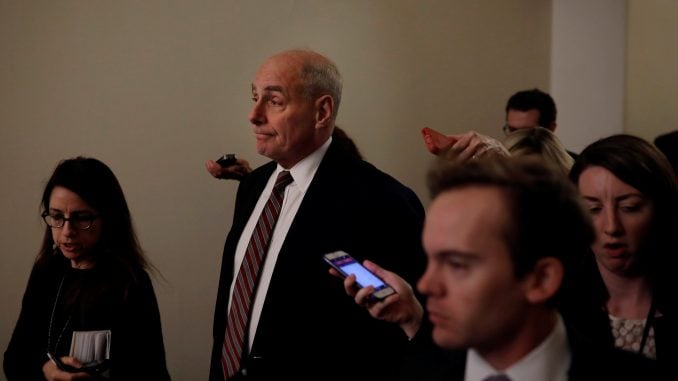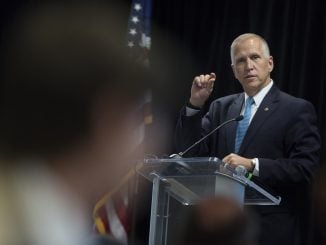
Raleigh — A deal on immigration as part of a new stopgap funding bill to avert a government shutdown appeared less likely on Wednesday after a Democratic senator dismissed the Republican plan saying it was “unacceptable” on immigration measures.
The White House dispatched chief of staff John Kelly to meet with the Congressional Hispanic Caucus to ease tensions over the status of “Dreamers” – young Hispanic adults brought to the country illegally when they were children – that is threatening to derail efforts on a temporary funding needed by Friday. The White House said on Wednesday it supports a short-term bill to fund the government and prevent a shutdown, even though its first preference would have been for a long-term deal.
“We do support the short-term CR,” White House spokeswoman Sarah Sanders told reporters, referring to a so-called continuing resolution to fund government operations. “However, it is not our first choice. We’d still like to see a clean funding bill — a two-year budget deal.”
However after the morning meeting, the two sides seemed as far apart as ever.
Democratic Representative Raul Grijalva left the meeting saying he was not “terribly optimistic” about getting a deal with the White House.
Republicans are working on another short-term spending bill to keep the government open beyond Friday, Senate Majority Leader Mitch McConnell said on Wednesday.
The funding measure that Democrats are rejecting does not include a legislative shield for Dreamers but it does grant Democrats an unrelated, high-priority measure: a six-year reauthorization of the Children’s Health Insurance Program (CHIP).
Senate Democratic Leader Chuck Schumer rejected the Republican stopgap proposal, calling it a “loser” in terms of what the country needs.

House Speaker Paul Ryan criticized Democrats for using DACA as leverage for helping pass a government funding measure.
Republicans also need to win support from fiscal conservatives in their own party. Ryan said party leaders have not checked whether Republicans have enough votes to keep government open.
“I think cool heads hopefully will prevail on this,” he said.

It also was unclear whether the conservative House Freedom Caucus would back the new plan. A Freedom Caucus source told Reuters the group, at a meeting on Tuesday night, “generally did not support leadership’s current strategy” on the stopgap bill although they did not take an official position.
The source said the caucus would rather fully fund the U.S. military for the rest of the fiscal year while just extending domestic spending at current levels for a month, as negotiations on an overall budget agreement continue.
Without a spending bill or a third continuing resolution, the federal government will shutdown Friday night. Money officially ran out Dec. 8, but was extended with two continuing resolutions, most recently to Jan. 19. With that deadline looming and political tension high, the Republican majority is working to get a deal pulled together quickly, while the Democrat minority tries to balance getting what they want for undocumented immigrants with a strategy to use a shutdown against President Donald Trump and Republicans in 2020 midterms.
The last time the government was shut down was in 2013 and previously in 1996.
Federal government shutdowns can stop many federal services, but postal service, Social Security and other benefits generally continue. Processing of passport applications, mortgages and small business loans can be delayed among other things. National parks and museums generally close and many non-defense federal employees are furloughed. In 2013, 40 percent, or 850,000 federal workers, were told to stay home for two weeks without pay.
The disruption looks bad regardless of which party is in power and, at least in the Senate, bipartisanship is needed to avoid it.
In the House a spending bill would pass with Republican votes but in the Senate, a spending bill needs 60 votes to pass, and Republicans hold a slim 51-49 majority there. At least some Democratic votes are needed to pass a measure. However, Democrats say they won’t sign a spending measure without protection for 800,000 recipients of Deferred Action for Childhood Arrivals, a program created by executive order under President Barak Obama in 2012.
A Trump executive order sunsets the program in March, and on Tuesday the White House said they’ll ask the Supreme Court to overturn the 9th Circuit Court of Appeals decision last week that said the administration had to keep taking DACA applications while lawsuits over it continued.
“It defies both law and common sense for DACA … to somehow be mandated nationwide by a single district court in San Francisco,” said U.S. Attorney General Jeff Sessions on Tuesday.
Meanwhile, Trump has said he’s willing to make a deal to help the Dreamers, but he has insisted that funding for border security, including the wall along the U.S. border with Mexico he promised as a presidential candidate, be included in any legislative package.
“We just got to back up a little bit and say we’re not that far away on border security, we’re not that far away on the diversity lottery, we’re not that far away from a reasonable, sustainable DACA provision and program for this population that’s worried sick about what happens on March 5,” Sen. Thom Tillis (R-N.C.) said in an interview on Fox News Tuesday.
The head of the Department of Homeland Security, Kirstjen Nielsen, told lawmakers on Tuesday that even if there is not a fix by March for so-called Dreamers, those who have registered with federal authorities will not be a top target for deportation.
“If you are a DACA that’s compliant with your registration — meaning you haven’t committed a crime and you in fact are registered — you are not a priority of enforcement for ICE should the program end,” she said.
Republicans are back at work on another proposal Wednesday to try to pass before the Friday deadline. Insiders expect it to include continued funding for the Children’s Health Insurance Program, $4.7 billion increase for missile defense and ship repair and $81 billion in additional disaster aid.



